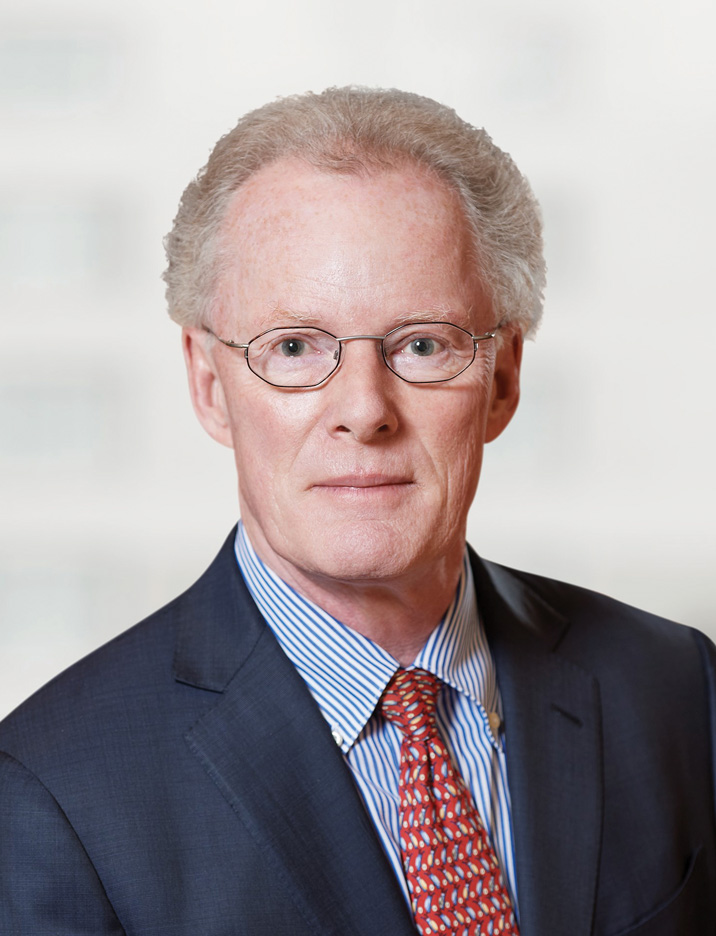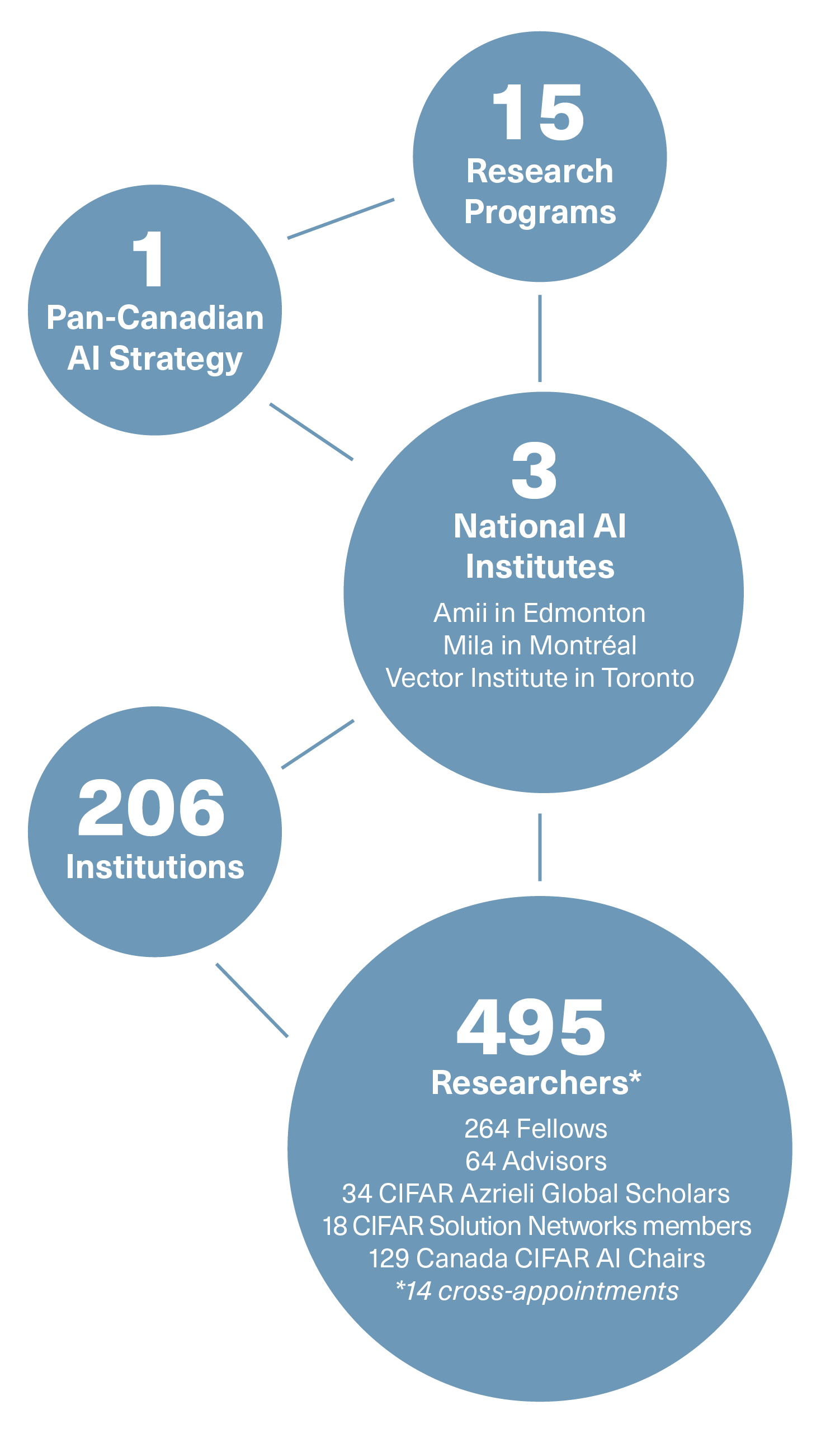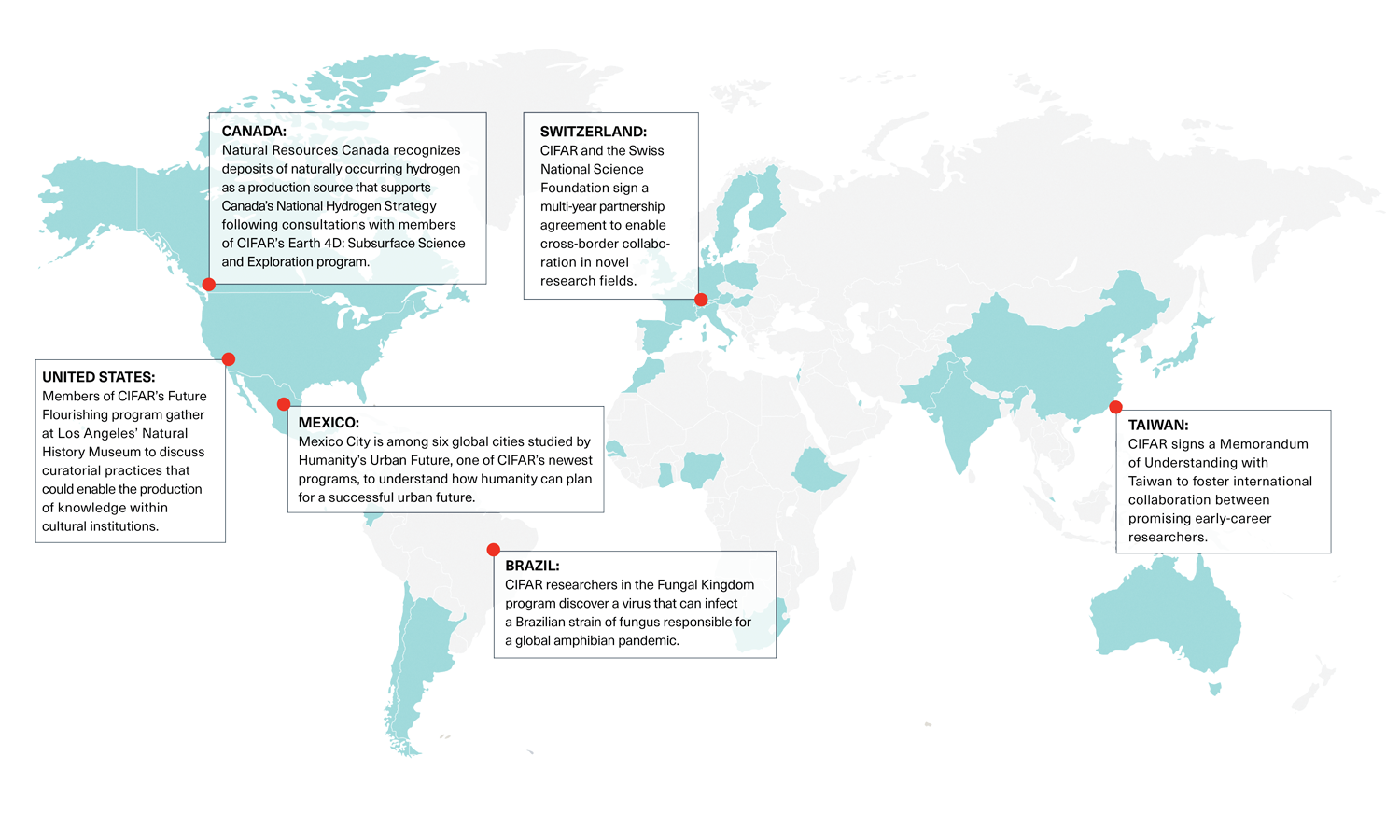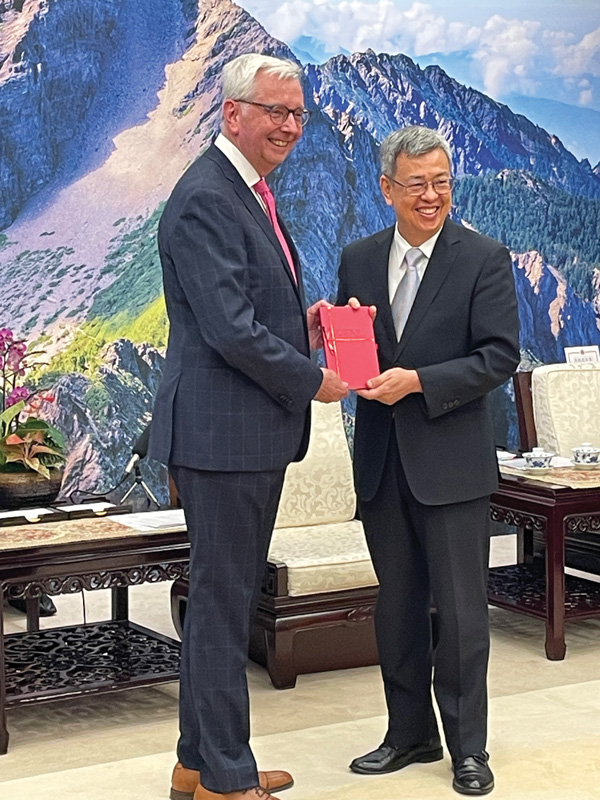Impact Report 2023-2024
THE PAN-CANADIAN AI STRATEGY AT CIFAR
Over more than four decades, CIFAR has nurtured the talent and conditions needed to lay the foundation for Canada’s thriving AI ecosystem. That’s why, in 2017, CIFAR was chosen to lead the world’s first national AI strategy.
Funded by the Government of Canada, the Pan-Canadian AI Strategy at CIFAR drives cutting-edge research, trains the next generation of diverse AI leaders and fosters cross-sectoral collaboration for innovation, commercialization and responsible AI adoption. The Pan-Canadian AI Strategy is delivering significant social and economic impact for Canada, with tremendous growth in our AI sector.
Working with Canada’s three National AI Institutes — Amii in Edmonton, Mila in Montréal and the Vector Institute in Toronto — CIFAR advances activities in four priority research areas:
ADVANCING AI SCIENCE
Martha White is developing AI agents that learn continually and adjust to ever-changing conditions.
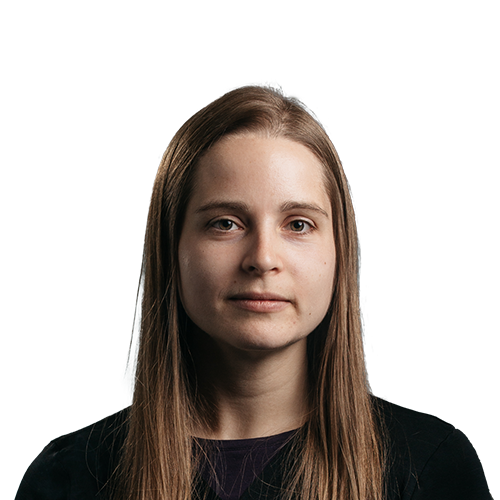
“Canada CIFAR AI Chair appointments help researchers to push forth their visions. For me to tackle the question, ‘How do I bring reinforcement learning into the real world?’ I need a larger team, and CIFAR funding helps me build that.” — Martha White, Canada CIFAR AI Chair, Amii; University of Alberta
AI FOR ENERGY & THE ENVIRONMENT
Gennady Pekhimenko is making machine learning models that are faster, and that use less energy.
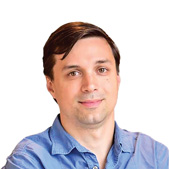
“The Canada CIFAR AI Chair appointment got me more connected with the machine learning community.” — Gennady Pekhimenko, Canada CIFAR AI Chair, Vector Institute, University of Toronto
AI FOR HEALTH
Jian Tang is leveraging graph machine learning and deep generative models to design proteins and molecules and find new therapeutic targets in drug discovery.

The Canada CIFAR AI Chair and the Mila environment have been critical to what I have accomplished so far, helping me connect and collaborate with pharmaceutical industry partners and other AI researchers.” — Jian Tang, Canada CIFAR AI Chair, Mila, HEC Montréal, Université de Montréal
RESPONSIBLE AI
Foutse Khomh is working to ensure AI systems will not create harm as they deliver benefits.
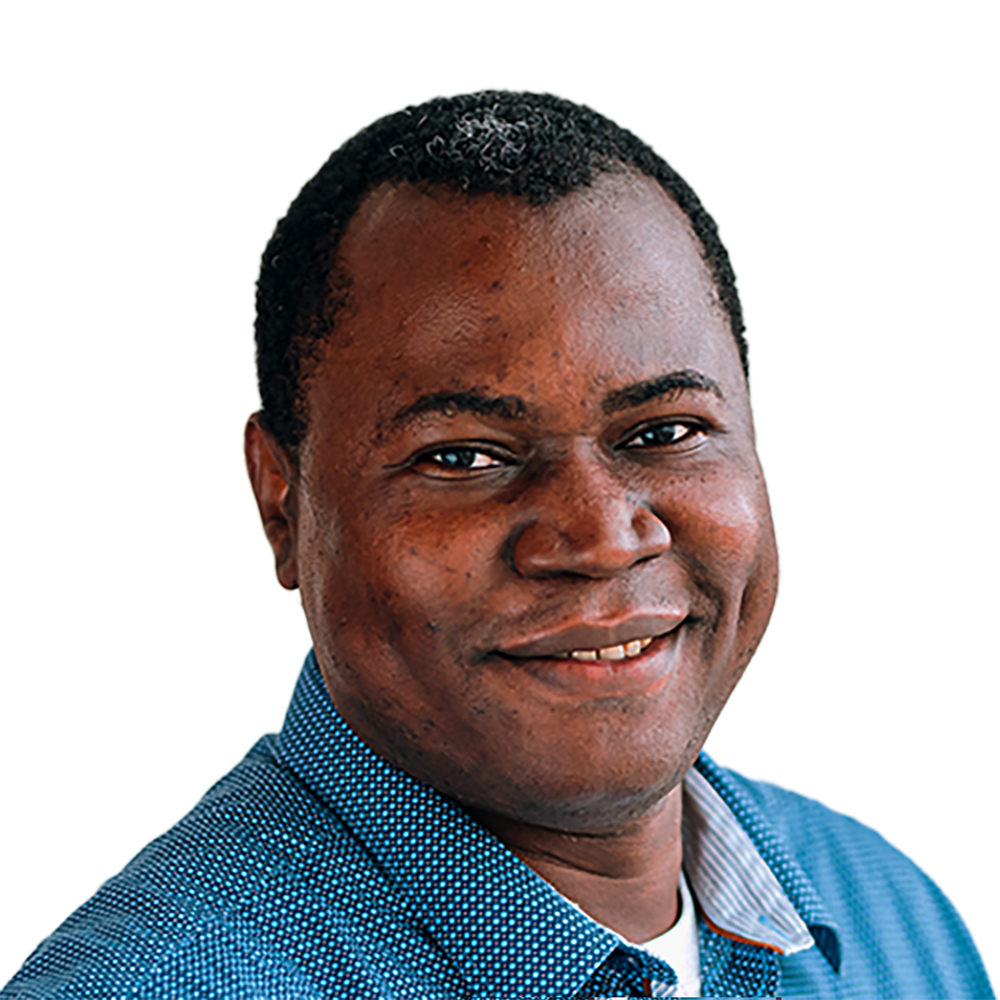
“The ecosystem at Mila is unique, and CIFAR is one of the strongest supports behind the creation of this space, where we can conduct multidisciplinary research.” — Foutse Khomh, Canada CIFAR AI Chair, Mila, Polytechnique Montréal
THE IMPACT OF THE PAN-CANADIAN AI STRATEGY AT CIFAR
129 Active Canada CIFAR AI Chairs
310 Number of trainees graduating annually from labs led by Canada CIFAR AI Chairs
2nd Canada’s ranking in the number of AI research papers published per capita
1,438 NextGen AI Training Program Trainees
357 Active research partnerships with industry among CIFAR and National AI Institutes
140,418 Number of actively engaged AI professionals
5th Canada’s ranking in Global AI Index
RESEARCH & IMPACT
CIFAR’s 15 research programs bring together some of the most extraordinary researchers from around the world. Their collaborations continue to make positive, lasting contributions in academia and beyond — and the organization’s renewed Strategy, launched in April 2024, promises to supercharge them to drive future impact in Canada and the world.
IMPACT CLUSTERS
In preparation for CIFAR’s new Strategy, we introduced five distinct Impact Clusters, which group our programs based on the significant global challenges they address. Research programs may span multiple clusters depending on the nature and goals of their work. While CIFAR embarks on thematically driven research, the organization continues to support new ideas and insights outside of these themes, such as our program in Gravity & the Extreme Universe.
As the work of the Clusters evolves, CIFAR will foster connections between Cluster programs, enabling greater research collaboration and interdisciplinarity. Here’s a snapshot of impact highlights across CIFAR’s Clusters:
BUILDING THRIVING SOCIETIES
CIFAR programs: Boundaries, Membership & Belonging; Child & Brain Development; Future Flourishing; Humanity’s Urban Future; Innovation, Equity & the Future of Prosperity
WORKING TO BUILD MORE EQUITABLE SOCIETIES
Boundaries, Membership & Belonging Fellow Evan Lieberman (Massachusetts Institute of Technology) is currently working on several climate-related research projects in South Africa and surrounding countries. Liberman spent a year conducting research at the African Climate and Development Initiative at the University of Cape Town. There, he sought to understand how people in different African countries, and in different ethnic groups, perceive the problems of climate change and their governments’ response to it. Meanwhile, in CIFAR’s Innovation, Equity & the Future of Prosperity program, members continue to engage with various industries and economic sectors to explore questions of inclusive innovation, particularly focusing on the care economy.
In May 2023, the program met in Ottawa with care economy stakeholders from Québec, Ontario and the U.S. — including representatives from labour, the social economy and venture funding — to discuss what innovations in policies, technology and management practices could improve the well-being of caregivers and paid care providers. The group also discussed equity issues related to women and immigration and how to build economic prosperity more broadly. Fellows Andrew Schrank (Brown University) and Caitlin Zaloom (New York University) are also exploring how complex power relations at home interact with innovation to change or reinforce gender power disparities. Their CIFAR Catalyst Fund project on “The Future of Home” explores the evolution of labour and technologies in 21st-century caregiving.
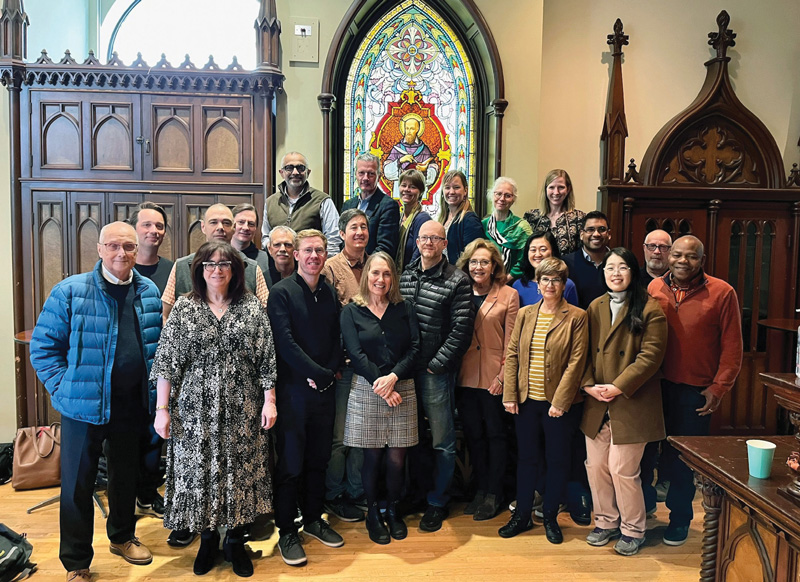 Members of Boundaries, Membership & Belonging at their program meeting in Montréal.
Members of Boundaries, Membership & Belonging at their program meeting in Montréal.
DECODING COMPLEX BRAINS AND DATA
CIFAR programs: Brain, Mind & Consciousness; Child & Brain Development; CIFAR MacMillan Multiscale Human; Future Flourishing; Learning in Machines & Brains; Pan-Canadian AI Strategy
PROBING QUESTIONS ABOUT BRAINS AND DATA UNLOCK NEW LINES OF INQUIRY
In the CIFAR MacMillan Multiscale Human program, one area of focus is how AI could be an important tool in improving our understanding of how the body works across scales, which could guide a new era of precision health and medicine. Fellow Aviv Regev (Human Cell Atlas) recently implemented two algorithms for generating molecular profiles from cell and tissue imaging data, while program Co-Director Gary Bader (University of Toronto) published related work on mapping tissue images to spatial gene expression. The program will continue to work closely with AI experts to improve existing machine learning techniques to better support multi-scale, mechanistic modeling, in order to create a better understanding of how the body works in healthy conditions and during disease.
In the Brain, Mind & Consciousness program, members are delving into the most mysterious data system of all — the brain. Thirteen CIFAR Fellows published a joint paper proposing a new framework to guide the search for consciousness in different systems. The paper lays out the nuances of what constitutes a consciousness test, how to validate it and the challenges inherent in this endeavour. This framework is not only of basic scientific interest — it also has major social and ethical implications by shedding light on what other things in our world may have consciousness, such as non-human animals.
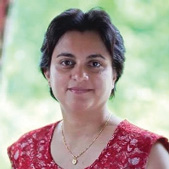
“I’m just grateful that CIFAR and MacMillan see this challenge as being fundamentally important, in terms of where we go next in mapping the human body, to really make that transformative next step, the radical change that’s needed to improve human life.”
MUZLIFAH HANIFFA
CIFAR Fellow, CIFAR MacMillan Multiscale Human,
Welcome Sanger Institute
EXPLORING EMERGING TECHNOLOGIES
CIFAR programs: Accelerated Decarbonization; Child & Brain Development; CIFAR MacMillan Multiscale Human; Earth 4D: Subsurface Science & Exploration; Future Flourishing; Innovation; Equity & the Future of Prosperity; Learning in Machines & Brains; Quantum Information Science; Quantum Materials; Pan-Canadian AI Strategy
MAKING QUANTUM LEAPS FORWARD IN SUPERCONDUCTIVITY
Quantum Information Science Fellows Irfan Siddiqi (Lawrence Berkeley National Laboratory) and Alexandre Blais (Université de Sherbrooke), alongside Advisor Ray Laflamme (University of Waterloo), convened a workshop in Montréal together with representatives from IBM, including former Fellow Jay Gambetta, to discuss barriers as well as research and development needs for scaling up superconducting quantum computers. The workshop brought together academic, industry and government experts, who conferred on the elements of a roadmap for advancing complementary technologies, such as cryogenics, modular architecture and control hardware — all needed for making practical quantum computing a reality. Program members have already shared insights from this workshop with policymakers, and they are now drafting a roadmap with other participants that can be further disseminated to help set the research and development directions for the sector.
CIFAR Fellows in the Quantum Materials program are also studying superconductivity, specifically an exciting new superconducting material called UTe2 (uranium ditelluride). This material is believed to be a triplet superconductor, a new type of superconductor with potential uses in quantum technologies. Researchers Johnpierre Paglione (University of Maryland) and Vidya Madhavan (University of Illinois at Urbana–Champaign), through a CIFAR Catalyst Fund project, continue to produce enormous impact in the field through experimental investigations of this material using scanning tunnelling microscopy and related techniques. Recent work has led to the discovery of a new electronic phase in the metallic state — a phase of charge-density wave modulations, which — subsequently led to the further discovery of a related phase (pair-density-wave) in the superconducting state of the same material by the group of Seamus Davis, a former CIFAR Advisor. Both of these results could lead to new streams of research to investigate the implications for fundamental studies and quantum technologies.
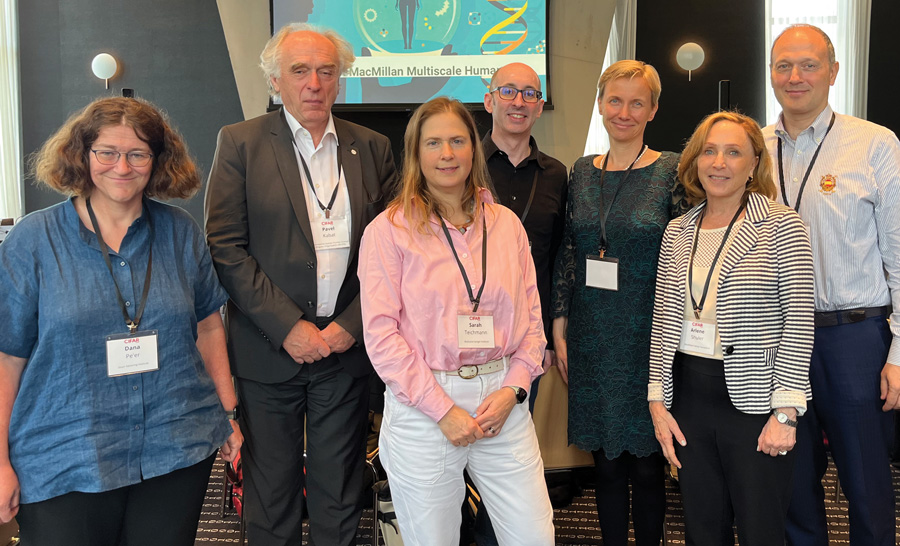
CIFAR MacMillan Multiscale Human program members Dana Pe’er (Fellow), Pavel Kabat (Advisor), Sarah Teichmann, Gary Bader, Katy Börner (Co-Directors), alongside Arlene Shuler and Kevin MacMillan of the MacMillan Family Foundation
The CIFAR MacMillan Multiscale Human program’s impact would not be possible without the transformational gift of the New York-based MacMillan Family Foundation. The Foundation’s gift, which began in the program’s inaugural year, ensures that the network of international researchers is positioned to revolutionize the understanding, treatment and prediction of major diseases that cause human suffering in Canada and around the world.
NURTURING A RESILIENT EARTH
CIFAR programs: Accelerated Decarbonization; Earth 4D: Subsurface Science & Exploration; Fungal Kingdom: Threats & Opportunities; Future Flourishing; Humanity’s Urban Future; Humans & the Microbiome; Pan-Canadian AI Strategy
UNEARTHING SOLUTIONS WITH ENVIRONMENTAL BENEFITS
Fellows Matthew Kanan (Stanford University) and Yogesh Surendranath (Massachusetts Institute of Technology) of CIFAR’s Accelerated Decarbonization program have developed a low-energy electrochemical method to make ultramafic rocks like olivine and serpentine more reactive to CO2. These rocks, along with millions of tonnes of mining waste, have the potential to remove trillions of tons of CO2 from the atmosphere, but under normal conditions, their reactivity with CO2 is negligible. Now, with support from a new Catalyst Fund project, Kanan and Surendranath’s research programs will explore additional methods for generating these materials, systematically analyze their properties and test them under conditions that are relevant for large-scale application.
In Earth 4D: Subsurface Science & Exploration, program Co-Director Barbara Sherwood Lollar (University of Toronto) and fellow members are paving the way for hydrogen research on a national scale in Canada.
In January 2024, program members convened a roundtable in Calgary on natural hydrogen — naturally occurring sources of hydrogen that could potentially be exploited to play a significant role in the green economic transition. The meeting, which included Canadian and international experts from academia, industry and government, evaluated the current state of natural hydrogen resource knowledge, assessed research and technological and policy gaps and discussed the next steps toward advancing research and development in this field. Through this meeting and subsequent engagement, Natural Resources Canada has since recognized deposits of naturally occurring hydrogen as a production source that supports Canada’s National Hydrogen Strategy, a major step forward in the work to grow the hydrogen economy and reduce emissions.

CIFAR’s Quantum Information Science program hosted a workshop in Montréal, inviting international experts to develop key steps to accelerate the scaling up of quantum computing capabilities in Canada.
SHAPING THE FUTURE OF HUMAN HEALTH
CIFAR programs: Brain, Mind & Consciousness; Child & Brain Development; CIFAR MacMillan Multiscale Human; Fungal Kingdom: Threats & Opportunities; Humans & the Microbiome
GENERATING SOLUTIONS TO IMPROVE HUMAN AND ANIMAL HEALTH
In recent years, there have been major advances in the study of viruses that infect fungi, known as mycoviruses. Viruses infect all forms of cellular life, and this includes pathogenic fungi that are themselves causing major global threats to humanity. Fungi kill 2.5 million people per year across the globe, and are causing the extinctions of many wild species posing a great risk to global biodiversity. Recently, Fellows in the Fungal Kingdom: Threats & Opportunities program have discovered that a fungal pathogen, a Brazilian strain of fungus involved in a global pandemic of amphibians, harbours a mycovirus in its genome. CIFAR researchers Tim James (University of Michigan), Matthew C. Fisher (Imperial College London), Lillian Fritz-Laylin (University of Massachusetts Amherst) and Jason E. Stajich (University of California Riverside) are studying the transmission of the virus and its impact on the host, with a foundational co-authored paper published in Current Biology. Surprisingly, the study discovered that the virus is associated with increased virulence of the fungal host when tested on a model amphibian species. Ongoing work will allow the team to study the interaction between the virus and its host at greater depths. This research was funded in part by Catalyst funds from CIFAR.
Importantly, this discovery of a DNA virus opens up opportunities to more broadly understand viruses of fungi as natural and manipulated controls of fungal infectious diseases both in humans and animals.
In another advance, members of the Humans & the Microbiome program have led the creation of three public health curriculum modules on the human microbiome, set to launch in 2024. The Public Health Microbiome Curriculum working group — comprised of Co-Director Melissa Melby (University of Delaware); Fellows Meghan Azad (University of Manitoba & Children’s Hospital Research Institute of Manitoba) and Naama Geva-Zatorsky (Technion); and Carolina Tropini (University of British Columbia; Alan Bernstein Fellow) — have developed modules on three key areas: breastfeeding and breastmilk, diet, and antibiotics and collateral damage to the microbiome. Greater knowledge in these areas has the potential to make a positive impact on human health and policy, from parental leave to understanding the importance of access to certain foods, such as fibrous foods.
FUNGAL THREATS
Each year, fungi kill 2.5 million people across the globe.
Fungal diseases account for 30% loss of crop yields today, posing a major threat to food security.
Fungal diseases are causing the extinction of many species, posing a great risk to global biodiversity.
OPPORTUNITIES
A lack of antifungals available to combat disease presents numerous opportunities for CIFAR researchers to develop novel strategies to thwart fungal disease and improve human, plant and animal health.
Read more about how CIFAR researchers have unlocked new insights that could stymie a global amphibian pandemic here
DEVELOPING FUTURE RESEARCH LEADERS
Early-career researchers bring fresh, bold thinking into CIFAR’s work. That’s why we remain committed to advancing the careers and trajectories of promising young research talents. We do this in many ways: by training the next generation, breaking down barriers that challenge inclusion and weaving the next generation into the fabric of CIFAR’s programs.
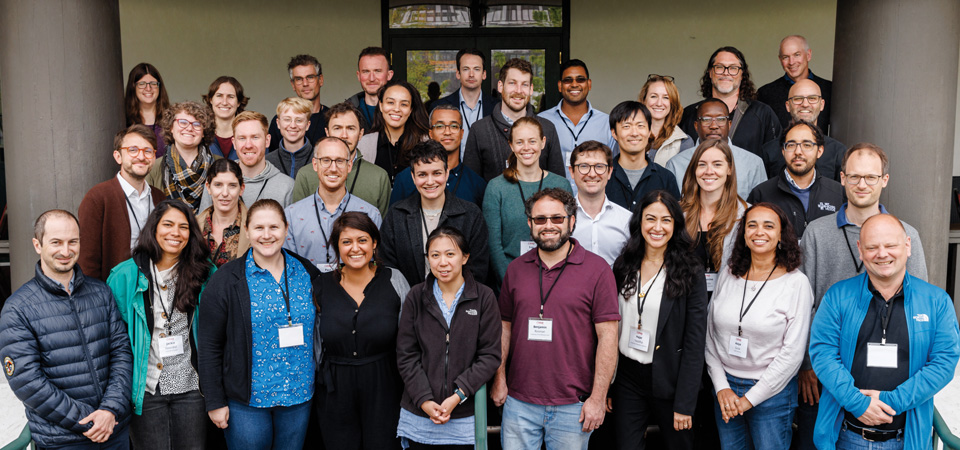
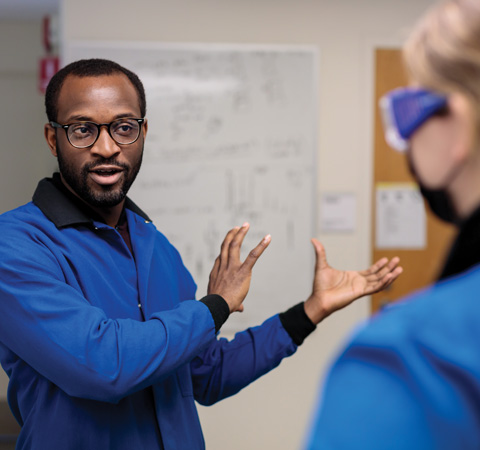
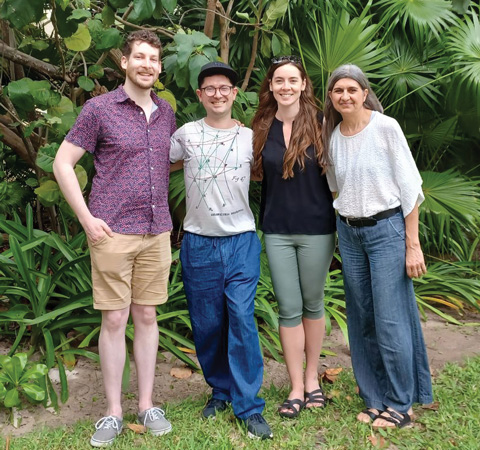
CIFAR AZRIELI GLOBAL SCHOLARS
Through the generous support of the Azrieli Foundation, 16 new early-career scholars were welcomed into the CIFAR Azrieli Global Scholars program in 2023. In total, 125 Global Scholars have joined the program since its inception in 2016. This world-class program welcomes young researchers into CIFAR’s programs, providing them with unparalleled opportunities to network among established leaders in their fields and contribute to the research outcomes of the programs. In addition, Global Scholars receive dedicated leadership training among their peer Scholars and two years of funding, giving them the necessary tools and resources to follow their ideas and projects in uncharted directions.
Snapshot
34 Number of CIFAR Azrieli Global Scholars in current appointment terms.
20 Number of CIFAR Azrieli Global Scholars who have been invited to become CIFAR Fellows after their Scholar terms were completed.
33 Number of new Catalyst Fund projects in 2023-2024 engaging Global Scholars, including 27 with a Global Scholar as the project lead.
98 Number of Catalyst Fund projects involving Global Scholars, accounting for approximately 30% of all projects launched since 2016.
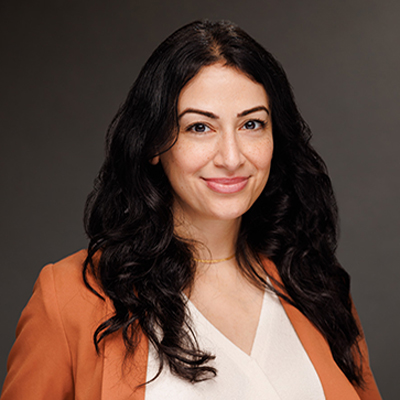
“CIFAR has been world-expanding in innumerable ways. I know of no other space where scholars across disciplines and the world can join and think together through some of humanity’s most pressing questions. The creativity that blooms from these meetings has changed the way I think about everything, from how I approach research design to how I teach and mentor my students.”
HAJAR YAZDIHA
CIFAR Azrieli Global Scholar,
Boundaries, Membership & Belonging,
University of Southern California
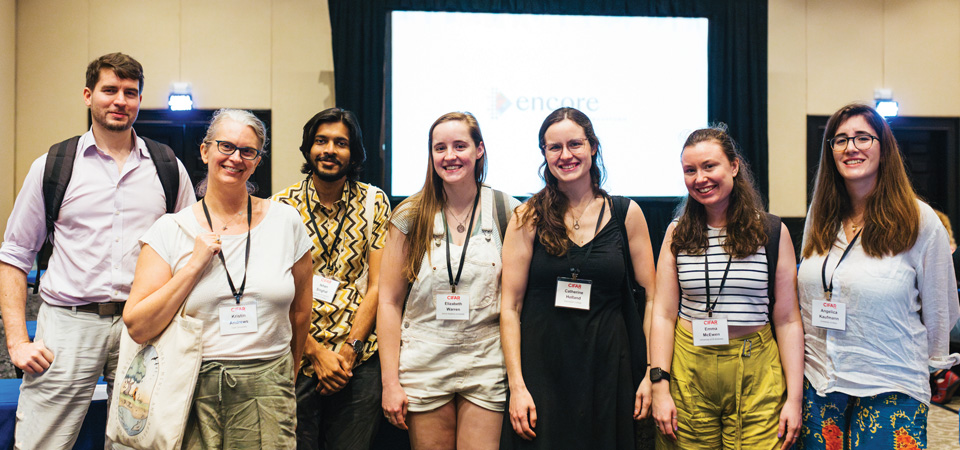
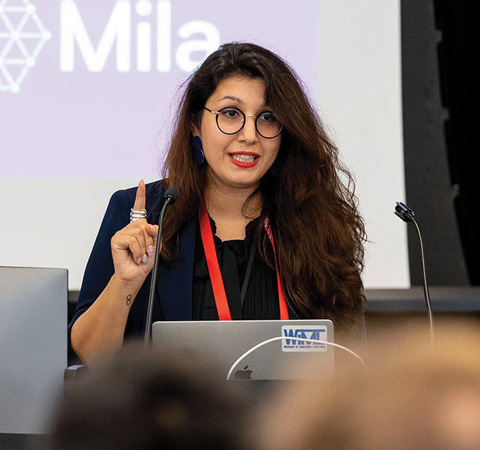
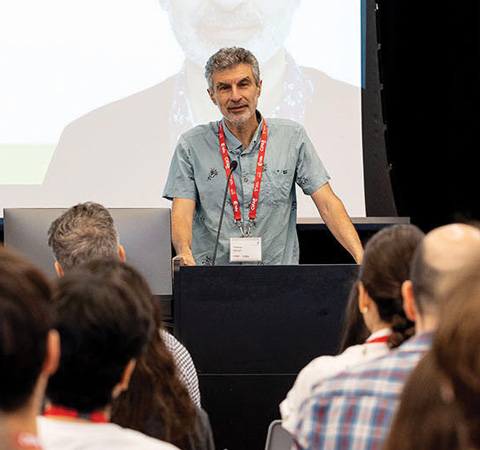
DLRL SUMMER SCHOOL: SHOWCASING CANADA FOR THE WORLD’S BRIGHTEST NEXT-GEN AI TALENT
For nearly 20 years, CIFAR has been bringing the world’s leading next generation AI scientists to Canada each summer for the CIFAR Deep Learning + Reinforcement Learning (DLRL) Summer School. This prestigious and intensive week of training and networking is designed to help attendees discover the next big leaps in AI science and their potential applications and impacts on society. More than 2,500 future AI leaders from around the world have attended since the launch of the program in 2005, hosted on a rotational basis yearly among the three National AI Institutes. The 2023 edition, hosted by Mila in Montréal, saw more than 150 early-career AI scientists from 19 countries enjoying the opportunity to learn and connect with each other in person.
CIFAR LAUNCHES INCLUSIVE AI SCHOLARSHIP
To lower barriers to participation of Black and Indigenous students in CIFAR’s partnered AI training programs, we launched the CIFAR Inclusive AI Scholarship, which covers the full costs of participation of self-identified Black and Indigenous (First Nations, Inuit or Métis) students in Canadian-based AI training programs delivered by our current NextGen AI Training Program partners.
NEXTGEN PILOT INITIATIVE UNDERWAY
CIFAR’s Child & Brain Development program launched a Next Generation Pilot initiative, supporting four early-career scholars to attend program meetings and engage in research with multiple program Fellows. The scholars received research support for projects of mutual interest. Among the inaugural cohort is Sarah Power, who had the opportunity to jointly work with CIFAR Azrieli Global Scholar Tomás Ryan (Trinity College Dublin), Fellow Paul Frankland (Hospital for Sick Children, Toronto) and Advisor Ulman Lindenberger (Max Planck Institute for Human Development) on cross-species work related to infantile amnesia and early “forgetting.” This work was profiled by Science Magazine, with the work of the team suggesting that memories generated in infancy may not be completely lost.
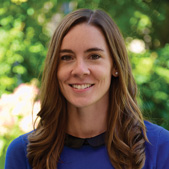
“Being part of CIFAR has had a tremendous impact on the start of my career, allowing me to network and collaborate with stimulating and diverse individuals from around the world. I truly believe it has propelled my career forward and has opened numerous doors. It seems like what I have gained in the past year in terms of exposure, networking and collaborations would have taken me 10 years to achieve on my own.”
CATHERINE DUCLOS
CIFAR Azrieli Global Scholar, Brain, Mind & Consciousness, CIUSSS du Nord-de-l’île-de-Montréal, Université de Montréal
BUILDING PARTNERSHIPS
At CIFAR, we know that successful research needs collaboration. Forging strong partnerships with mission-aligned supporters is necessary to deepen and scale our work for the future. This past year, CIFAR worked closely with partners across the globe to grow diverse research ecosystems, broaden areas of exploration and amplify the impact of our community’s work.
BUILDING SUPPORT FOR CANADIAN INITIATIVES OVERSEAS
Over the past year, CIFAR has forged partnerships with organizations with complementary mandates in East Asia. CIFAR's President & CEO, Stephen Toope travelled to Taiwan, meeting with the Premier of Taiwan, Chien-Jen Chen in Taiwan. There, he signed an MOU with the Department of International Cooperation and Science Education, National Science and Technology Council. Through this MOU, both CIFAR and the National Science and Technology Council of Taiwan will partner on a series of next-generation symposia — events that will foster international collaboration between bright and promising early-career researchers. Later in the year, Toope also hosted Institute for Information & Communication Technology Promotion (IITP) of Korea’s President, Sung-Bae Jun at CIFAR’s offices in Toronto to sign an MOU focusing on technology and innovation, including the development and deployment of responsible AI.
INDUSTRY SUPPORT OPENS AVENUES TO EXPLORE AI SOLUTIONS FOR THE CARBON CYCLE
In March of 2024, CIFAR received a Google.org grant of $1 million USD to bolster critical research in sustainability and responsible AI. The grant will be used, in part, to support CIFAR’s Accelerated Decarbonization program, which brings together experts in carbon capture, storage and utilization, biochemistry, chemistry, biology and more to address the carbon cycle and offer new ways of solving climate-related problems. The funding will also support CIFAR’s work to promote responsible AI research and development.
COLLABORATING WITH RENOWNED RESEARCH INSTITUTIONS
UNDERSTANDING CONSTRAINTS FOR FUTURE TECHNOLOGICAL ADOPTION
Building on a long-standing history, CIFAR deepened its collaboration with the British Academy, forging a multi-year partnership centred on advancing new frontiers of technology. The Academy will provide £ 1.46 million in funding to CIFAR to advance work in the two programs: Future Flourishing and Innovation, Equity & the Future of Prosperity. Both programs are part of CIFAR’s Exploring Emerging Technologies Impact Cluster, part of our efforts to identify profoundly important issues and opportunities to address them through cross-program collaboration.
The research supported by this partnership with the British Academy will explore new technologies and systems that show promise for society, while examining their potential implications. By exploring the cultural contexts in which the technologies of tomorrow emerge, researchers can better understand the social, economic and political constraints that determine future technological adoption.
CIFAR’S FIRST PARTNERSHIP WITH SWITZERLAND
CIFAR was proud to formalize its first partnership agreement with Switzerland, a country renowned for its research excellence. In September of 2023, CIFAR signed a multi-year agreement with the Swiss National Science Foundation (SNSF), laying the groundwork to strengthen cross-border collaboration in science, technology and innovation between the two organizations. SNSF will contribute $6 million CAD to CIFAR as part of the agreement.
The partnership will support greater engagement between CIFAR’s research community and Swiss-based researchers, with connections between the two research communities already underway. Cross-border collaboration in novel research fields will be propelled through various activities co-developed by CIFAR and SNSF, including meetings and access to the Catalyst Fund.
Stephen Toope with the Premier of Taiwan, Chien-Jen Chen.
Partnering for Impact
95 Formal partnerships with governments, research organizations, industry and foundations.
211 CIFAR convened 211 experts working beyond academia — such as policymakers, clinician scientists and industry leaders — with our research community and undertook 12 engagements focused specifically on societal impact.
288,000,000 Amount of funding CIFAR researchers have reported receiving in 2023-2024 from external (non-CIFAR sources) to scale projects arising from CIFAR programs.
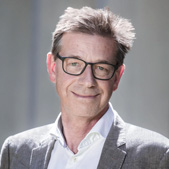
“CIFAR encourages ambition, cross-discipline synergies and real-world impact at the same time. The CIFAR Azrieli Global Scholars Program inspires me to think bigger, broader and deeper about important questions facing our society.”
MATTHIAS EGGER
President of the National Research Council of the SNSF

